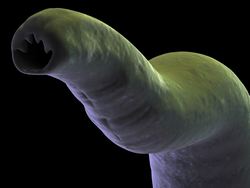Novel animal parasite vaccines
Livestock welfare is impaired by worm infections ubiquitous in cattle, sheep and goats. These cause gastro-intestinal, respiratory or liver disorders that affect sustainable production efficiency and require drug treatment. However, the global emergence of drug-resistant worm strains necessitates alternative solutions such as vaccination. The scope of the EU-funded PARAVAC(opens in new window) (Vaccines against helminth infections) project was to develop vaccines against a number of livestock parasites such as Haemonchus contortus, Cooperia oncophora and the fluke Fasciola hepatica. To this end, researchers utilised recombinant proteins, proteins isolated from parasite secretions or others found in the stomach of infected animals. PARAVAC successfully developed and launched a commercial vaccine to control Haemonchus contortus in sheep, cattle and goats. Additionally, highly effective prototype vaccines were developed against Cooperia oncophora in cattle and Fasciola hepatica in sheep and cattle. The efficacy of the vaccines was validated in field trials around the world on housed and grazing livestock. Considerable effort was dedicated towards defining the protective immune responses induced by these vaccines as well as elucidating the mechanism of immune evasion by parasites. Scientists also exploited nanoparticle and bacterial biofilm technologies as vaccine delivery vehicles. Nanoparticles proved promising for antigen delivery directly to the enteric mucosa of dogs when vaccinating against Echinococcus granulosus as this tapeworm can cause fatal disease in man. An important aspect of the PARAVAC project was its dissemination activities. Project partners interacted closely with the animal health industry, farmer organisations and other stakeholders to define required vaccine characteristics. Taken together, the PARAVAC deliverables promise to improve livestock health by controlling helminth infections. Since livestock farming is socially, economically and politically very significant for the EU, the vaccines will help minimise economic losses. Furthermore, they have the potential to reduce environmental contamination and importantly minimise the development of anti-helminthic resistance.







